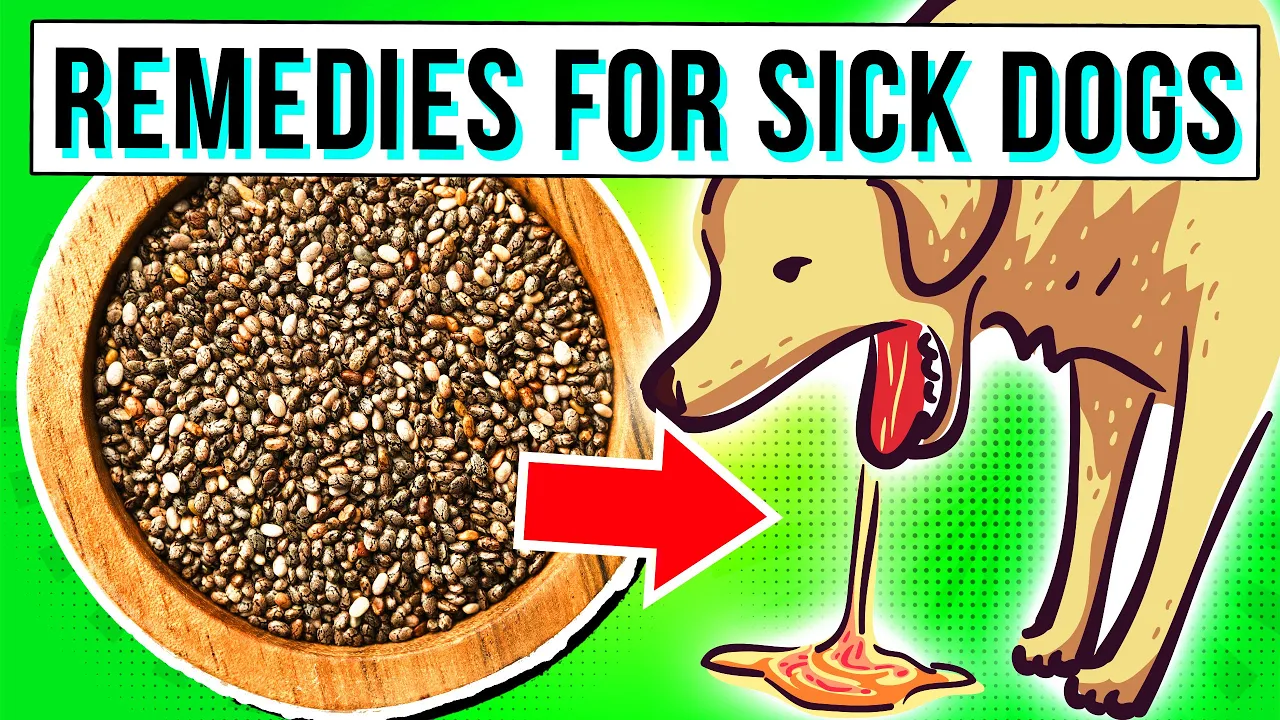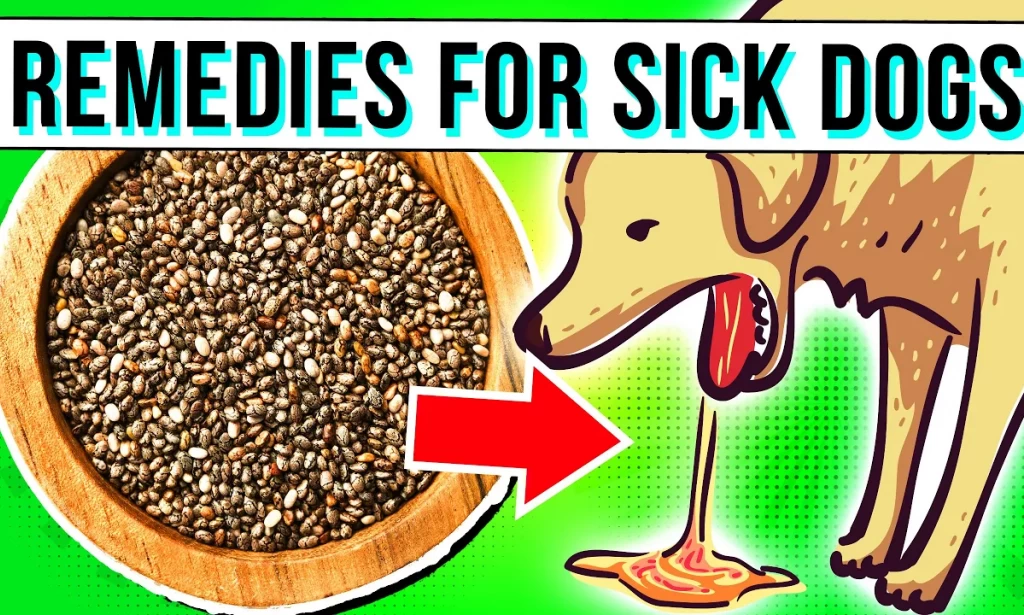5 BEST Remedies For Your Dog’s Diarrhea, Vomiting, Or Upset Stomach

If your stomach is upset, you usually turn to ginger ale or crackers to soothe it. That may work for humans, but what about your dog? Numerous factors can cause gastrointestinal problems in dogs, but fortunately, many of these problems can be treated naturally at home with a few nutrients or medicines. Even though many digestive problems resemble one another, a wide variety of underlying health issues can produce symptoms like vomiting or diarrhea. These conditions can range in severity from very minor to extremely serious. Today's article discusses some vital aspects of canine digestive problems, supplements, and remedies for your dog's diarrhea, gas, vomiting, or upset stomach.
Let’s get started. Pet owners may feel compelled to take immediate action in response to the defensive sounds made by their animals when they are experiencing stomach irritation (gastric pain), are about to vomit, or are longing for irregular feces.
You will most likely be familiar with his routines and mannerisms if you're a dog owner. Let's discuss diarrhea before getting to the core of the problem. When your dog passes non-formed, loose, or watery feces more frequently and in bigger volumes, than they would typically poo, it is referred to as diarrhea. It is a prevalent condition that is not a sickness in and of itself but rather a sign or symptom of other diseases or problems. It may result from a simple ailment, like a dietary error, that you can resolve with easy therapy or from a major sickness that calls for more complicated treatments. Dogs are susceptible to electrolyte imbalances and dehydration. Due to the risk of fatal dehydration from high fluid and electrolyte losses, water is the most crucial nutrient for dogs with acute diarrhea, whether or not they are vomiting. Therefore, being aware of the potential cause of your dog's diarrhea can help you decide when it is more important to take your dog to the doctor than to treat them at home. How Serious Is Dog Diarrhea? Dog diarrhea typically goes away in a day or two and is self-limiting. In most circumstances, there is no cause for concern because many dogs with diarrhea act and feel fine. Fasting your dog and switching to plain meals are all needed to stop diarrhea. The most frequent concern, however, is dehydration if the episode of diarrhea lasts for more than a few days. Your dog will become dehydrated if they don't consume enough liquid to replenish the fluids lost through watery stools or vomiting. Pinch the skin at the back of your dog's neck and then release it to see if they’re dehydrated. It ought to immediately recover. Your dog may be dehydrated if the squeeze of skin takes a second or longer to return to normal. If your dog fails the pinch test, it's a good idea to consult your holistic doctor because dehydration can be harsh on your dog's heart and kidneys, especially if there is a lack of appetite. So let's now move to the five most important remedies.
Fast your dog for a day or up to 24 hours. Sometimes all that a dog needs is a few hours for its digestive system to recover and start over. Withholding food for 12 to 24 hours can flush out whatever icky thing caused the problem and reset it to a healthy state. Even though your dog is fasting, keeping them hydrated is crucial. Don't allow them to consume too much liquid at once since this could make them throw up or start another round of diarrhea. In this situation, there is no damage in fasting for a few hours, and vets usually recommend it. Undoubtedly, complete or modified fasting and some type of calorie restriction are natural components of a wild dog's diet and are beneficial to their health. Multi-strain probiotics help during gas and diarrhea. In addition to removing harmful bacteria from the gut, diarrhea also wipes out the beneficial flora. Choose a canine probiotic to reintroduce these healthy, living bacteria. While plain yogurt might be helpful, it cannot compare to a high-potency probiotic formulated with the proper microorganisms. Make sure the product you select has several strains of beneficial bacteria, not just one. Three probiotic strains are present in the probiotic soft chew that dogs use. Probiotics are helpful microorganisms that naturally prevent and treat various health issues, including diarrhea. Your dog will benefit from postbiotics like butyrate and lactic acid provided by probiotics. These assist in controlling the intestinal immune system of your dog. One of the leading causes of diarrhea is inflammation, which they aid in reducing. Let's quickly review the best probiotics for dogs that are experiencing diarrhea:
Saccharomyces boulardii: is a helpful yeast that successfully arrests diarrhea from viral and antibiotic use. Bacillus subtilis: increases colonic water absorption, which reduces diarrhea. Combined with Enterococcus faecium, it can lessen the severity of symptoms in more severe chronic forms of diarrhea, such as inflammatory bowel disease and colitis. Pediococcus acidilactici: Has been demonstrated to considerably reduce the recovery period in dogs with gastroenteritis when combined with B subtilis and other probiotics. Lactobacillus acidophilus: This tried-and-true probiotic is another go-to for treating canine diarrhea. Make sure at least two strains we discussed are present in your dog's probiotics. Probiotics can also ease your dog's adjustment to a new food or reduce gas. The amount of fecal biogenic amine was lowered, which lessened the canine feces' odor. Provide a Bland Diet to your dog for a few days.
Gradually transition from a fast to a bland, easily absorbed diet. Try serving plain white rice with shredded boiled, unseasoned, white flesh chicken. Feed a few spoonfuls every two to three hours, then gradually increase the amount throughout the day. A bland diet for your dog is simple to make at home. White flesh chicken or extra-lean hamburger is required. 25% low-fat protein and 75% boiling white rice make up the recipe (the chicken or ground beef). The main ingredient in the meal is rice, which serves as a binder, while the meat mostly serves as an attractive component to urge the dog to consume. If you choose chicken, ensure there are no bones and remove the skin. Make sure the meat is lean and drain the fat after cooking if you go with a hamburger. Fat can aggravate an upset stomach and lead to pancreatitis. Avoid seasoning the plain diet with any oils, fats, or spices. Until your dog feels better, feed him the bland diet in three or four small meals spread throughout the day. Veterinarians recommend beginning with a small amount, such as a tablespoon, to determine whether your dog is ready for food. If they can control it effectively, you may administer more two hours later. If your pup continues to thrive, the meals can be gradually increased in size and spaced out farther. Two teaspoons every two hours could be increased to half a cup every three to four hours, for example. After that, gradually reintroduce their regular food by giving them a diet mix that is 75% bland and 25% regular for a few meals, followed by a 50/50 mix, followed by a 75% regular/25% bland, until your dog is once more only eating dog food. Give your dog a pumpkin or a prebiotic supplement. Prebiotics include plantains, slippery elm, chia seeds, and canned pumpkin puree (NOT pumpkin pie filling!). Prebiotics contain natural gastrointestinal healing properties. Prebiotics are a type of non-digestible food that encourages the development of healthy bacteria in the intestines. In other words, PRE-biotics serve as the foundation of nutrition for PRO-biotics. The fiber in pumpkin puree helps to bulk up stools since it is abundant. It is claimed that slippery elm coats and soothes mucous membranes, especially those in the GI tract. Plantains offer antimicrobial qualities, and chia seeds are fiber-rich and can absorb extra water. Always check with your veterinarian before making dietary modifications for your dog. Psyllium fiber, which you can purchase over the counter as whole husks, can also be found in products such as unsweetened, unflavored Metamucil or this dog-formulated fiber brand. You may provide a teaspoon for smaller dogs and up to 3 teaspoons for larger dogs, once to twice daily, mixed into their food. You can also finely grind the psyllium fiber if desired. To aid in digestion, try giving your dog digestive enzymes. The cause of your dog's gastrointestinal problems may frequently be due to inadequate digestion. Some dogs have difficulty digesting fiber, carbs, lipids, or proteins. Digestive enzymes aid in your dog's breakdown and absorption of all of these nutrients. These essential enzymes can assist because runny poop episodes are caused by a failure to absorb nutrients. Let's discuss a few, like… Protease: It enhances the digestion of meats by dissolving proteins into amino acids. Amylase: This enzyme converts starches into digestible carbohydrate molecules for your dog.
Lipase: It helps in digesting fats in your dog's digestive tract. Cellulase: This enzyme also helps to degrade plant and grain fibers. All four enzymes should be present in any effective digestive enzyme supplement for dogs. Thankfully, most cases of diarrhea improve on their own. By attentively monitoring your dog's behavior and applying this simple dog diarrhea home remedy, you may help your dog quickly return to normal. Pet owners know that, unless it gets too severe, you can handle most of their health issues at home with gentle affection and appropriate care. A happy and healthy dog is essential to living a long life with its owners.



You must be logged in to post a comment.